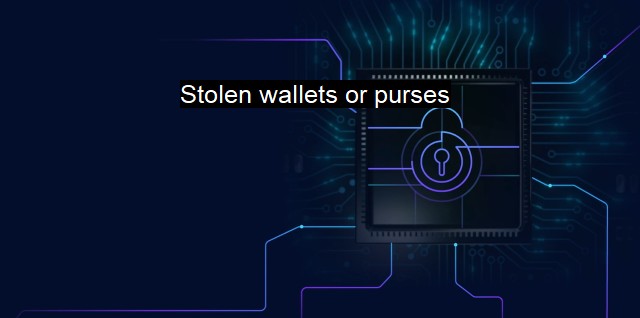What are Stolen wallets or purses?
"Stolen Wallets Or Purses" often refers to a significant problem - the theft, either physically or digitally, of sensitive personal and financial information. With the rise of digital economies and online transactions, the contemporary understanding of this concept extends drastically beyond the conventional circumstances of losing a physical wallet or purse.In overall digital parlance, a wallet refers to a depository of some kind, usually involving currency or personal identity items. The traditional perspective of this concept would be similar to how you would imagine a physical wallet to contain cash or credit cards. Still, as we tunnel into the digital realm, the definition and implications change dramatically. In the modern sense, digital wallets can relate to cryptocurrency wallets holding Bitcoin or other digital currencies, and on the more worrying end of the spectrum, it can mean the storage of your bank account details and other personally identifiable information, much like the contents of an actual purse.
Comprehensively, the idea of a stolen wallet or purse has transmuted into an umbrella term that manifests within cybersecurity as identity theft, credit card fraud, online scamming, phishing, and more. The invaluable prominence of a strong antivirus and sound cybersecurity norms could not be stated enough in the prevention of such a wallet or purse being stolen interactively.
Antivirus software can significantly diminish the risk of stolen wallets or purposed by safeguarding one's devices from ever evolving malicious software, targeting unsuspecting individuals. Strong cybersecurity ensures that your personal details, including your financial information, are securely guarded in an encrypted format utilizing robust cryptographic techniques.
Improved cybersecurity practices can lead to early detection and prevention of breaches. despite rigorous cybersecurity measures, advanced phishing efforts by cyber-criminals can trick individuals into knowingly sharing sensitive information disguised as urgent and official looking correspondences from thought-to-be-trusted sources, thus raiding their digital wallets or purses.
Multifactor authentication, robust passwords, avoidance of unsecured websites, and regular software updates are just some of the precautionary principles in strong general cybersecurity hygiene, in addition to comprehensive antivirus software. With these, the likeliness of one's digital wallet being compromised is diminished greatly.
Emergence of blockchain technology has also significantly influenced cybersecurity around digital wallets, adding another layer of protection by decentralizing and thus adding difficulty to stealing of wallets. Blockchain's intrinsic use of encryption and decentralized authority reduces the prospect of fraud and unauthorized access to personal details; ensuring an individual's digital wallet remains protected from potential hackers.
In summation, "stolen wallets or purses" has evolved from an actual physical risk to a digital menace - a potent threat heralding great danger to personal privacy and financial security. Yet simultaneously, this has spurred the advent of progress in cybersecurity and antiviruses, leading to ever-renewed measures to protect one's sensitive digital data. In this digital era, protecting your digital wallet or purse is as crucial as guarding your physical one, and having enriched cybersecurity and antivirus measures in place is perhaps the single most assured guard against would-be digital pickpockets.

Stolen wallets or purses FAQs
What should I do if my wallet or purse is stolen, and I'm worried about my personal information being compromised?
The first thing you should do is contact your bank or credit card company to report any stolen cards or unauthorized charges. Next, file a police report and inform the authorities if your driver's license or any other forms of identification were stolen. Consider placing a fraud alert or security freeze on your credit report to prevent any fraudulent activity. Finally, monitor your accounts and credit report regularly to ensure that no additional unauthorized activity takes place.Can a thief access my personal information from my stolen wallet or purse?
It's possible. If your wallet or purse contains identification, credit cards, or other sensitive personal information, a thief could use that information to commit identity theft or make unauthorized purchases. That's why it's important to take immediate action to protect yourself if your wallet or purse is stolen.Can antivirus software protect me from identity theft if my wallet or purse is stolen?
Antivirus software is designed to protect your computer or mobile device from malicious software and online threats. While it can't protect you directly from identity theft if your wallet or purse is stolen, it's still an important tool in your overall cybersecurity strategy. Make sure you have up-to-date antivirus software installed on all of your devices, and use strong passwords and two-factor authentication to further protect your accounts.What steps can I take to prevent my wallet or purse from being stolen in the first place?
There are several steps you can take to reduce the risk of your wallet or purse being stolen. Always keep your belongings with you or in a secure location, such as a locked locker or safe. Avoid carrying large amounts of cash or unnecessary credit cards. Be aware of your surroundings, and report any suspicious activity to authorities. Finally, consider using technology such as RFID-blocking wallets or purses to prevent electronic pickpocketing.| | A | | | B | | | C | | | D | | | E | | | F | | | G | | | H | | | I | | | J | | | K | | | L | | | M | |
| | N | | | O | | | P | | | Q | | | R | | | S | | | T | | | U | | | V | | | W | | | X | | | Y | | | Z | |
| | 1 | | | 2 | | | 3 | | | 4 | | | 7 | | | 8 | | |||||||